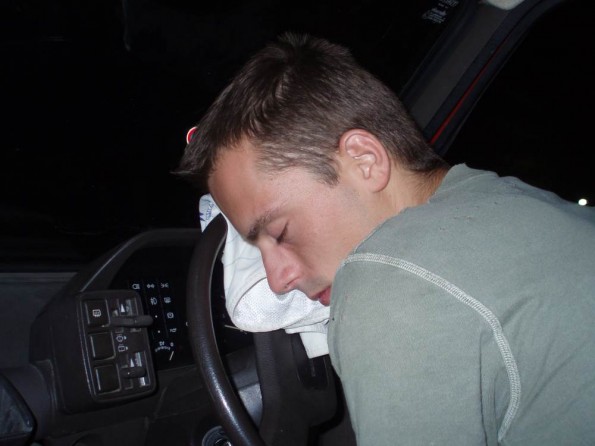What can affect your driving as much as driving drunk? Tiredness is the answer. Tiredness, fatigue or drowsiness can slow down our reactions and make it difficult for us to concentrate. Suddenly you’re asleep, in a head-on with a road train and you never wake up. More people die in fatigue-related crashes than drink-driving crashes in NSW.
Recognising the risks and signs of driving tired
A number of physiological things start to happen as you get tired.
- You begin to yawn more and more frequently
- You start to blink more rapidly and your eyes might feel itchy, scratchy or tired (and you want to rub them)
- Your head begins to nod
Your driving skill starts to be affected
- It becomes more and more difficult to stay within your lane and you might find yourself repeatedly crossing the centre line or being jolted to attention by a rumble strip or cat’s eyes
- It becomes more and more difficult to keep at the same speed as the vehicle in front; you’ll either drop back or end up tailgating
- You miss road signs or can’t remember the last one you passed
- You can’t remember the last few k’s you drove
- You sometimes oversteer or understeer in corners, misjudging the corner’s angle
If you’ve waited long enough your body is probably having little microsleeps – short periods of sleep from a second or so up to a few minutes. Obviously, the longer they are, the more risk you have of either having a head-on collision or running off the road. If you’re having microsleeps you might notice that the road noise stops for a second. This happens as you drift out of consciousness.
Fatigue-related crashes are almost twice as likely to be fatal because you won’t react to slow your vehicle down, so the consequences are larger.
What causes drowsiness?
There are a large number of causes and some of them depend on your specific situation:
- If you drive when your body’s circadian rhythm says you should be sleepy (mid-afternoon and between 3-7am)
- Certain medications will cause drowsiness. Usually these are noted and you will be warned not to drive. For more information read this article.
- Certain medical conditions can cause sleepiness, especially if they cause low blood sugar, or interrupt sleep such as sleep apnoea
- Sleep can be interrupted by a restless partner, a new baby, worry and anxiety, watching TV just before going to bed, and changing your body’s natural sleep rhythm e.g. due to jetlag or staying up late studying or partying
- Eating a large, heavy meal can give you what some people call a ‘food coma’ where you feel extremely sleepy as your body tries to deal with breaking down the new food. Fatty foods and large portions of protein are worse for this
- Not drinking enough – dehydration can also be as bad as drink driving
- Physical and mental exhaustion from work or working out
- Your car is just too comfortable and warm
Motorcyclists have proportionally less sleep-related crashes, perhaps because riding a motorbike is a more physical and less comfortable place to be than in a car.
Who tends to have sleep-related crashes?
- Guys under 30 years old
- People aged 60+
- Shift workers
- Jetlagged people
Stopping drowsiness while driving
The only cure for tiredness is sleep, but you can do a couple of things to very temporarily delay your sleepiness:
- Open the window to get some fresh air in the car, or open your visor on a motorbike
- Turn on music fairly loud, or sing if you’re on a motorbike
- Talk to a passenger if you’re in a car
These three only work for a matter of a few minutes, or perhaps half an hour. They are not long-term solutions.
Better options
- Don’t start driving if you already feel tired
- Share the driving with someone else so that you can rest or sleep
- Get at least 8 hours sleep before you start driving
- Don’t start driving late at night
- Don’t drive during your usual sleeping hours
- Manage the temperature in your vehicle so it’s not so warm that it makes you feel sleepy
- Take regular breaks. Use rest stops and service stations for a quick walk around and stretch, or take a 20-minute power nap (but no more than 20 minutes otherwise you’ll be groggy when you wake up)
- Eat an apple, eat some dark chocolate or drink a caffeinated drink half an hour before setting off (it needs this much time to take effect)

Improvise a pillow in your car, or simply lean the driver’s seat all the way back and close your eyes. Remember to set an alarm for 20 minutes, though!
